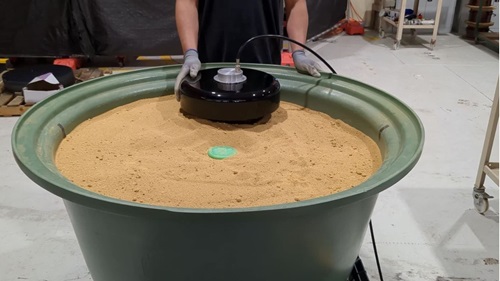New landmine detection technology, developed by Australia’s national science agency CSIRO, could soon help landmine-affected countries with their demining efforts.
Landmines and other explosive remnants of war are a global humanitarian crisis, with over 100 million landmines deployed in more than 60 countries, causing around 6,500 casualties each year.
CSIRO and corporate advisor RFC Ambrian have jointly established a new Australian company, MRead, to develop the technology into hand-held detectors that more quickly, accurately, and cost-effectively detect landmines for clearing.
CSIRO Chief Executive Larry Marshall said MRead builds on decades of CSIRO expertise in developing ore sorting technologies in the mining sector into creating a company that will generate new jobs and save lives.
“Science-driven innovation is solving our greatest challenges – from growing our economy by creating new industries and reinventing old ones, through to tackling a global humanitarian crisis that injures or kills thousands of people every year,” Dr Marshall said.
“The precision of this technology will be a game-changer for landmine-clearing efforts, delivering a solution that is faster and more reliable than current detectors, which in turn protects the people doing the clearing and expands the range of clearing efforts to make the world a safer place.
“I’m proud to see world-class science driving innovation from Australia reaching out globally to make lives better around the world," he said.
CSIRO developed magnetic resonance technology that detects the molecular signature of explosives used in landmines, making it more reliable than the metal detectors currently used to uncover landmines.
The heightened accuracy of MRead’s hand-held devices means clutter such as bottlecaps and shrapnel will not be detected, a problem which significantly slows down the current metal detection and clearance process.
Retired Brigadier and Managing Director of MRead, John Shanahan, DSC and Bar, AM, OBE, understands first-hand the impact this innovation can make in countries recovering from conflict.
“The magnetic resonance landmine detection technology will have profound impact on areas recovering from and currently experiencing hardship and danger from uncleared minefields,” Mr Shanahan said.
“These enduring explosive remnants of war inhibit freedom of movement, limit access to food, water, schools, hospitals, and shelter that jeopardises the safe recovery and return of civilian populations.
“MRead is excited to bring this game-changing technology into the market to speed up the process of clearing minefields, improve confidence in detection and bring down the cost of demining," he said.
MRead’s first customers will be humanitarian non-government organisations such as The HALO Trust who carry out mine clearance activities throughout the world.
Matthew Abercrombie, R&D Officer at The HALO Trust, said landmines continue to directly impact the lives of people in some of the poorest communities in the world.
“Landmines kill and injure men, women, boys and girls, they kill valuable livestock, and they prevent safe access to homes, infrastructure and productive farmland,” Mr Abercrombie said.
“The HALO Trust’s mission is to protect lives and restore the livelihoods of those affected by conflict. Landmine clearance is still primarily done using handheld metal detectors as this minimises costs and environmental impact.
“However, demining is a slow process and HALO is always looking for new equipment and techniques that can increase clearance efficiency. Detectors which can reliably discriminate between landmines and other metallic objects have the potential to have a major impact in this area.” he said.
MRead plans on deploying its first hand-held detectors with the HALO Trust to landmine-affected regions in Southeast Asia in 2024.
Note to editors
In 1997, 150 countries signed the United Nations-brokered Anti-Personnel Mine Ban Treaty.
Since then, mine clearance has been a priority action for the UN with many dedicated charities involved in humanitarian landline clearance.
The United Nations declared 4 April the International Day for Mine Awareness and Assistance in Mine Action.

